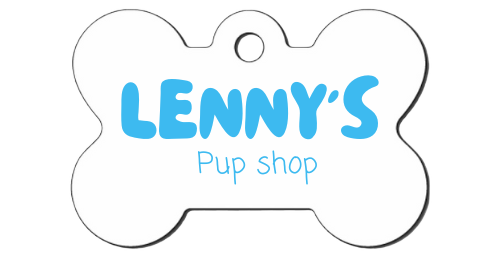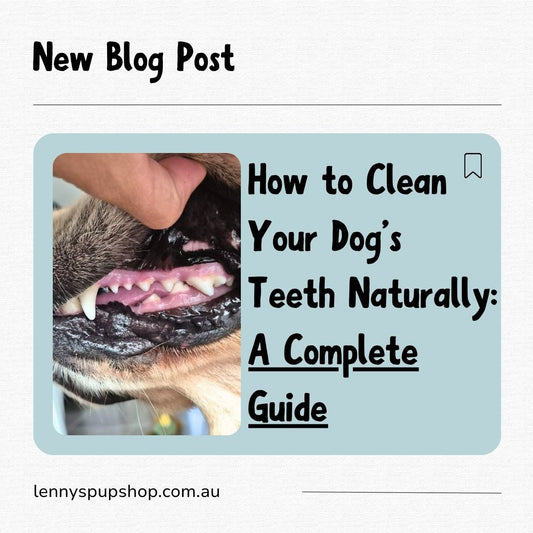Home Remedies for Dogs with Itchy Skin
Share
Itchy skin in dogs can be more than just an occasional scratch. For many pups, it becomes a persistent and uncomfortable issue. As a dog parent, it can be upsetting to watch your furry friend constantly licking, chewing, or scratching. Understanding the root cause is the first step to offering relief.
At Lenny's Pup Shop, we are all about natural, safe, and effective support for your dog. In this blog, we explore the most trusted home remedies for itchy skin in dogs. These are remedies you can start at home while working closely with your vet.
What Causes Itchy Skin in Dogs?
Before jumping into home treatments, it's important to understand the common triggers for itchy skin in dogs:
- Environmental allergies such as pollen, dust mites, or mould
- Food intolerances, often from chicken, beef, wheat, soy, or dairy
- Flea or mite infestations
- Yeast or bacterial skin infections
- Dry skin from cold weather or frequent bathing
- Health conditions like hypothyroidism or Cushing’s disease
If your dog is scratching excessively, losing hair, or showing signs of infection, book a vet appointment before trying home remedies.
Chamomile and Green Tea Baths
Chamomile and green tea are gentle, natural remedies known for their anti-inflammatory and soothing benefits. They are helpful for calming red, irritated skin.
How to use: Steep three to five tea bags in warm water for five minutes. Let your dog soak in the bath for 10 minutes. For smaller areas, cool the tea and pour it over your dog’s skin as a rinse.
Colloidal Oatmeal Soak
Colloidal oatmeal is finely ground oats that help moisturize the skin and form a barrier against irritants. It reduces redness and inflammation naturally.
How to use: Grind plain oats into a powder. Add the powder to a warm bath and let your dog soak for 10 to 15 minutes. You can also make a paste with water and apply it to specific spots.
Apple Cider Vinegar Spray or Soak
Apple cider vinegar is known for its antibacterial and antifungal properties. It is especially useful for mild skin infections and itchy paws.
How to use: Mix equal parts water and apple cider vinegar in a spray bottle. Spray onto affected areas or use as a five-minute paw soak. Avoid using on broken or open skin.
Aloe Vera Gel
Aloe vera is a powerful natural moisturizer that helps with itching, burning, and inflammation. It hydrates dry skin and promotes healing.
How to use: Use pure aloe vera gel without alcohol or additives. Apply directly to the affected area and let it absorb. Rinse off after 10 to 15 minutes if needed.
Coconut Oil
Coconut oil helps soothe dry, flaky skin and has antimicrobial benefits. It can help with eczema, bites, and skin allergies.
How to use: Refrigerate coconut oil until it hardens, then rub a small amount onto irritated skin. You can also mix a small dose into meals if recommended by your vet.
Baking Soda Paste
Baking soda has natural anti-inflammatory and pH-balancing effects. It helps calm itching and irritation.
How to use: Mix equal parts water and baking soda into a paste. Apply to itchy spots for 20 minutes before rinsing. You can also add baking soda to bath water.
Turmeric and Coconut Oil Paste
Turmeric contains curcumin, which is a strong anti-inflammatory compound. Combined with coconut oil, it can help reduce swelling and support healing.
How to use: Mix turmeric powder and coconut oil in equal parts. Apply to irritated areas and leave on for 10 to 15 minutes. Rinse with warm water and towel dry.
Plain Yogurt for Gut Support
Some skin conditions are linked to gut imbalance. Plain, sugar-free yogurt provides healthy bacteria that support digestion and the immune system.
How to use: Feed one teaspoon to small dogs and two teaspoons to larger dogs once or twice per week. Always check with your vet before introducing dairy.
Omega-3 Fatty Acids
Omega-3s help reduce inflammation and improve coat and skin health. They are beneficial for dogs with dry or itchy skin.
Sources: Fish oil, sardines, flaxseed oil, or omega-rich dog treats. Speak to your vet for the right dosage.
Try our Freeze-Dried Sardines for a rich source of natural omega-3s.
Dietary Adjustments
Your dog’s diet plays a major role in skin health. Food allergies are often overlooked causes of skin issues.
Try switching to:
- Novel proteins like kangaroo, venison, or salmon
- Limited ingredient diets
- Grain-free options
- Avoid chicken, wheat, soy, corn, and beef if allergies are suspected
You can also work with your vet to trial an elimination diet. This helps identify and remove ingredients that cause reactions.
When to See a Vet
While home remedies can provide relief, some cases require professional care. Visit your vet if you notice:
- Persistent scratching or hair loss
- Foul odour or greasy skin
- Wounds, scabs, or open sores
- Red or swollen ears
- Lethargy or appetite changes
Your vet can recommend treatment such as allergy medications, medicated shampoos, or prescription diets.
Shop Natural Skin-Supporting Treats at Lenny’s Pup Shop
At Lenny’s Pup Shop, we are committed to offering clean, natural dog treats that support allergy-prone dogs. All our treats are free from preservatives and made from single-ingredient Aussie proteins.
Support your dog’s skin naturally with these options:
- Fish Fingers – 100% Flathead Fish
- Roo Cleaners – For Oral Health
- Emu Femur – Long-Lasting Chew
- Beef Liver Snaps – Single Ingredient
-
Arthritis Pack – Joint and Skin Support
Visit lennyspupshop.com.au to explore our full range of treats for sensitive skin and happy tummies.
Disclaimer: This blog is for informational purposes only. Please consult with a licensed veterinarian before starting any new treatment or supplement for your dog.



